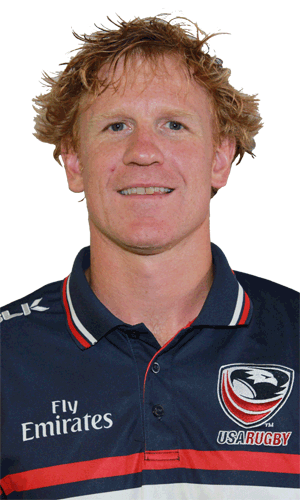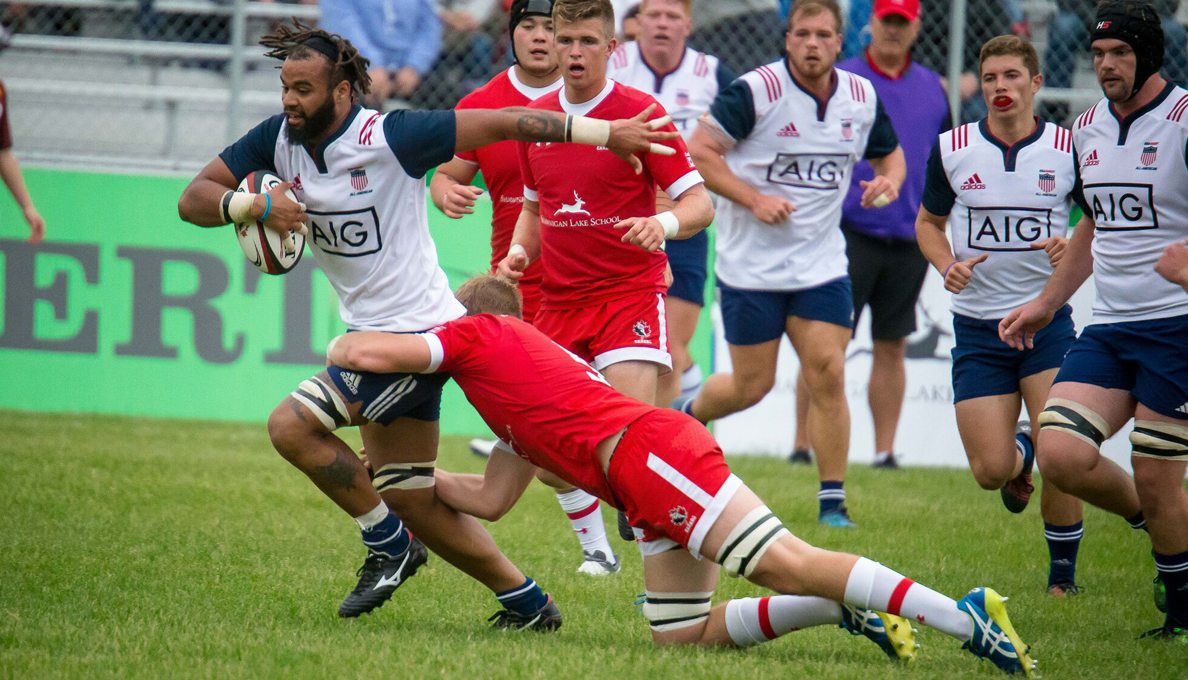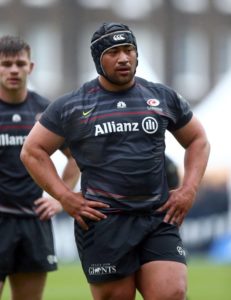
EDMONTON, ALBERTA – The Junior All-America’s win on Saturday against Canada U20s, 27-25, was not enough to erase the massive point differential accumulated in their 12-46 defeat in game one. A combined aggregate victory of 71-39 by Canada pushes them through to the World Rugby U20 Trophy tournament.
BUDGET ISSUES:
Before we get to the recap of the series, it is worth addressing the rumblings about funding. Tony Ridnell recently wrote that a Board member of USA Rugby was unaware that this was the situation for the USA U20s. We reached out to Alex Magleby, USA Rugby General Manager, National Teams & Performance for a clarification. He explained that the age-grade levels are not funded by the USA Rugby Membership. He said that the funding for the likes of the Junior All-Americans comes from Philanthropy, Grants and Pay-to-Play. With the budget issues existing for the whole of USA Rugby, there is no trickle down monies for the age-grades that may or may not have been there in the past. As for the rumors the Jr. All-Americans’ matches vs Canada were in jeopardy, Magleby said that simply wasn’t the case:
Tony Ridnell recently wrote that a Board member of USA Rugby was unaware that this was the situation for the USA U20s. We reached out to Alex Magleby, USA Rugby General Manager, National Teams & Performance for a clarification. He explained that the age-grade levels are not funded by the USA Rugby Membership. He said that the funding for the likes of the Junior All-Americans comes from Philanthropy, Grants and Pay-to-Play. With the budget issues existing for the whole of USA Rugby, there is no trickle down monies for the age-grades that may or may not have been there in the past. As for the rumors the Jr. All-Americans’ matches vs Canada were in jeopardy, Magleby said that simply wasn’t the case:
 “Two very important donors came through with funds that enabled certain need-based players to attend that might have otherwise had difficulty doing so, while also helping to alleviate the costs for players and families.”
“Two very important donors came through with funds that enabled certain need-based players to attend that might have otherwise had difficulty doing so, while also helping to alleviate the costs for players and families.”
When asked about the senior Collegiate All-Americans and whether their scheduled tours were canceled because of money, Magleby answered:
“No. Nothing was scheduled to be canceled. There were different tour ideas discussed but they weren’t realistic with our financial situation. We are working on something now. We will be announcing shortly the Collegiate All-American program for the end of the summer.
In response to our follow-up question about whey there wasn’t a program already in place for families to plan at this point, Magleby explained:
“It’s taken more time to time find the right partners and help fund the All-Americans this year.”
PERSONAL EXPERIENCE:
As a player who tried out for the U20 team this year, I was impressed by the system that JD Stephenson put together to scout talent regionally before calling a final tryout at the Olympic Training Center. Taking part in these selection camps costs hundreds of dollars, but players aren’t complaining; that is the cost of playing rugby in America. Whether it is out-of-pocket or through GoFundMe pages, they will find a way to pay and play.
On the age-grade level, players and coaches are put in difficult situations which make competing at the highest level harder. With that in mind, the Junior All-Americans were actually fortunate to be defeated by Canada in the first match… rather than having to forfeit. I applaud everyone on the U20 team that went up to Edmonton, and it is understandable why they were not completely prepared for the first match. This is not an excuse, but rather an explanation of the challenges of being a high-level rugby player in America. Overcoming the obstacles makes Saturday’s bounce-back victory all the more impressive.

RECAP:
Let’s take a look at how the World Trophy Qualification Series played out.
The Junior All-Americans selected a strong squad this year. With the series being moved to after the collegiate season, players from schools like Cal and St. Mary’s were now available. In previous years they were unable to compete.
The first half of Game One played out to be close, with tries by captain Malon Al-Jiboori and Daemon Torres of Life University making the score 12-19. However, simple errors and penalties allowed Canada to explode for 27 points in the second half. Cristian Rodriguez stood out. The fast and shifty fullback from Lindenwood was able to penetrate the Canadian defense.
The Americans found themselves behind at halftime again 8-20, after the Canadians scored beyond the 20th minute. Vice-captain and –recently graduated high schooler Ruben de Haas – scored the first points off of a penalty and Christian Dyer of Cal dotted down for the Junior All-American’s first try. Peter Howard of Naas RFC in Ireland started the US comeback in the second half. Torres scored two times late in the match and Samuel Walsh of Scots College in New Zealand kicked the conversion to give the Junior All-Americans the lead and victory… 27-25.
WHAT TO DO?
A loss is a loss, but the errors made are helpful as to what must be addressed going forward in our age-grade rugby. Players in the All-American programs have not seen enough international competition outside of North America. The High School All-American’s XV tour to the European Championship was a great change, but a last-place finish in a tournament against teams like Portugal, Spain, Belgium, and Canada is not what we should be producing. This is not the fault of the players or coaches. Rather, other countries are simply playing each other more, while the United States is attempting to figure out how to afford these trips. During my two years in the High School All-American program, I did not play a match against another national side, which certainly surprising. Competing against the best within America will not raise the level of play leading up to an eventual appearance in the World Trophy Tournament, winning it or advancing to the World Rugby U20 Championship. International experience should come in the years leading up to an international championship, not at the championship tournament itself.

After one match of experience, the All-Americans looked like a different squad; one that was able to comeback from a halftime deficit. Experience is the key. The more time players compete at top levels – time on the job – the better their performances will be. Unfortunately for the Junior All-Americans, they got up to speed too late this time. But as noted above, experience comes at a cost and given the current financial situation of USA Rugby, that is easier said than done.
ACADEMIES TO THE RESCUE?
Gaining experience with European academies sides (like Titi Lamositele), would at first seem to eliminate the funding needed from USA Rugby. Lamositele was scouted after playing in a tournament in England with the High School All-Americans. Unfortunately, those opportunities have been rare the past few years.
American rugby will continue to gradually get better over the years, but more immediate improvement will only come through younger and more frequent experience and exposure to international competition… Fingers crossed.
Feel free to comment and share and “Like” our Facebook Rugby Wrap Up Page and follow us on Twitter@: @RugbyWrapUp, @Luke Bienstock, @Matt_McCarthy00, @Junoir Blaber, @JWB_RWU, @Ronan Nelson, @MichaelHalsey24, @MeetTheMatts, @Brian C Cole and @Declan Yeats.
ICYMI: Be sure to check out the new weekly @RugbyWrapUp show. Listen or watch:
P.s… Give my boys @DartmouthRugby a follow. Thanks.

